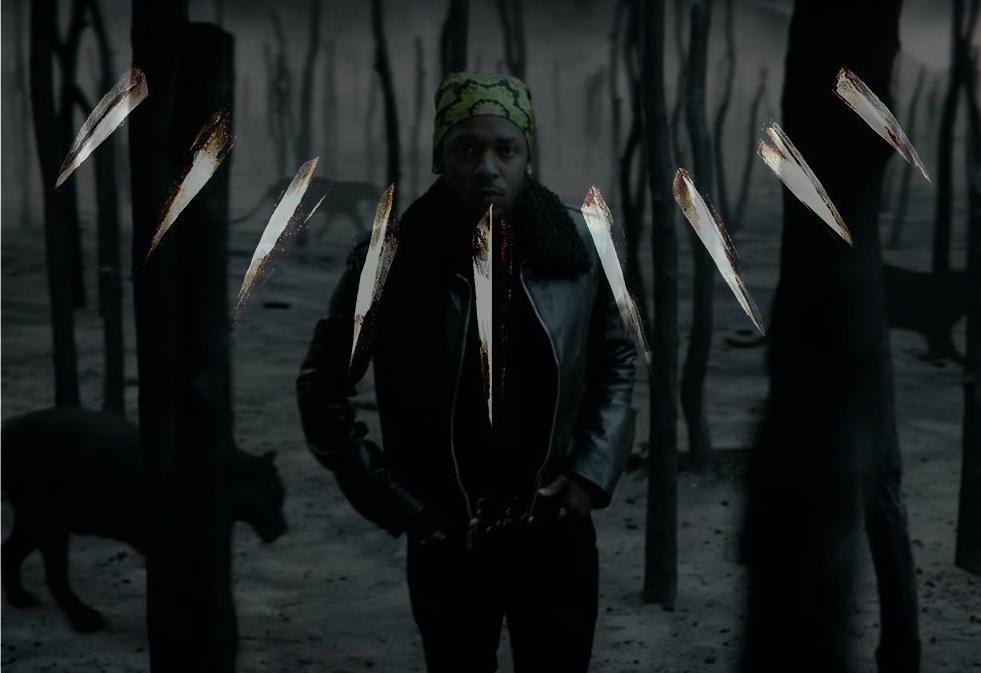Phenomena: Kendrick Captures 'Black Panther' Culture
In a world where comic book movies have become monotonous and overtly commercialized, one hero emerges to save moviegoers from boredom — and his name is Black Panther. And what is a superhero without a super album behind him? The highly anticipated album Black Panther The Album Music from and Inspired By was released Feb. 9 as the entire country eagerly awaited the original works by Kendrick Lamar, Anderson .Paak, Ab-Soul, Future and many more prominent hip-hop artists. The album is not the official soundtrack for Marvel’s upcoming Black Panther, as that was recorded with a 132 piece orchestra by Swedish composer Ludwig Göransson (who has a history of collaboration with Childish Gambino). However, the album does capture the spirit of the forthcoming black superhero epic better than any orchestral arrangement could.
Black Panther The Album is far from the standard milieu of action-movie music. Do not expect to find any “Eye of the Tiger” or some pump-up 1980s rock classic. The album has already sent a message to the viewing public that Black Panther is not like every other superhero movie that has inundated the viewing public these past few years. Black Panther, the album and the film, is here to make a statement. It is here to say that there is another side to the comic-book genre than The Avengers and the Guardians of the Galaxy soundtrack. This is entertainment for those who don’t fit in with the mold of superhero fans, because the movie doesn’t fit in with superhero movies.
The enormous potential Black Panther had even before its release on Feb. 16 is nothing to be ignored. Any film with an accompanying album voluntarily created by some of contemporary music’s biggest artists has the ability to pull in viewers from all ends of the entertainment spectrum. Frankly, this is the modern equivalent of Simon & Garfunkel doing the soundtrack for Michael Nichols The Graduate. Where Ben Braddock descends into the pool as “Sound of Silence” ominously plays, I see Black Panther’s alter-ego T’Challa emerging from the ashes of his fictional, shattered African nation of Wakanda to “I am” by Jorja Smith.
It is also impossible to ignore the social implications that the album and film Black Panther carries. Lamar acknowledges the air of divisiveness on which we are all suffocating in the album’s titular track, “Black Panther,” when he says:
"Sisters and brother in unison, not because of me/ Because we don't glue with the opposition, we glue with peace/ And I'm still gon' f--- up your organization if any beef/ What do you stand for/ Are you an activist?/ What are your city plans for?"
The song itself is written from the perspective of the main character T’Challa, but it could just as easily be coming from Lamar on a solo LP. Even though this is an album for a major motion picture produced by Marvel and distributed by Disney, Kendrick doesn’t even pretend to censor himself. If he did, that would just speak ill of the entire project. How could a revolutionary movie about a black superhero live to its full potential if the writer of the official album was forced to whitewash his music to fit with the mainstream?
The writers of the album don’t diverge from the writers of the movie in that they make no attempt to conform their differences in order to blend in with the general viewing public. Simply put — this album has integrity, something that has been painfully missing from the mainstream movie culture for quite some time. Even if you are not a hip-hop or comic book fan, this album will send you to Fandango to find the next screening of Black Panther. There is something so innately danceable to the music, but it also is able to hold onto its substance in the lyrics. These are not party bangers to be blasted at full volume while you nervously look around the room for your friends. This is serious lyricism that can also be seriously grooved to.
Another standout song that highlights the diversity of Black Panther is “Paramedic!” by SOB x RBE. The track begins with acapella vocals from Kendrick and Zacari with the lyrics “No one's perfect/But no one's worthless/We ain't deserving of everything Heaven and Earth is,” and then immediately drops into a silky-smooth beat from producers Sounwave, CuBeatz and DJ Dahi that harps back to Kendrick’s 2012 breakthrough album Good Kid, M.A.A.D. City, which DJ Dahi had a hand in producing. The song is emblematic of the overall vibe of Black Panther in its ability to move seamlessly between emotional social commentary and hard swaggering lyrics from some of modern hip-hop’s best and up-and-comers.
When I first got word of the parameters of the Black Panther film, I thought it was just another shameless marketing ploy by film studios to pull in every demographic possible; no different from ABC’s racial melting-pot lineup of The Goldbergs, Fresh off the Boat and The Real O'Neals. But when I heard about Kendrick Lamar’s plans to create an accompanying album for the movie, much of which wouldn’t even be used in the actual film, I knew that there was something special going on. This was not just another vain attempt at marketing “inclusion” in order to get meat in the seats.
Perhaps this is the dawn of a new age of superhero movies. Maybe now not every single fringe character will get their own standalone series as part of a years-long money-milking franchise strategy meant to sell the viewer only a small piece of the universe at a time. What if now, we return to films of substance. Films that don’t require you to know every constellation in the Marvel universe in order to understand the next film? What if movies go back to being entertainment and not assignments? Black Panther has the power needed to revolutionize the comic book movie industry.

